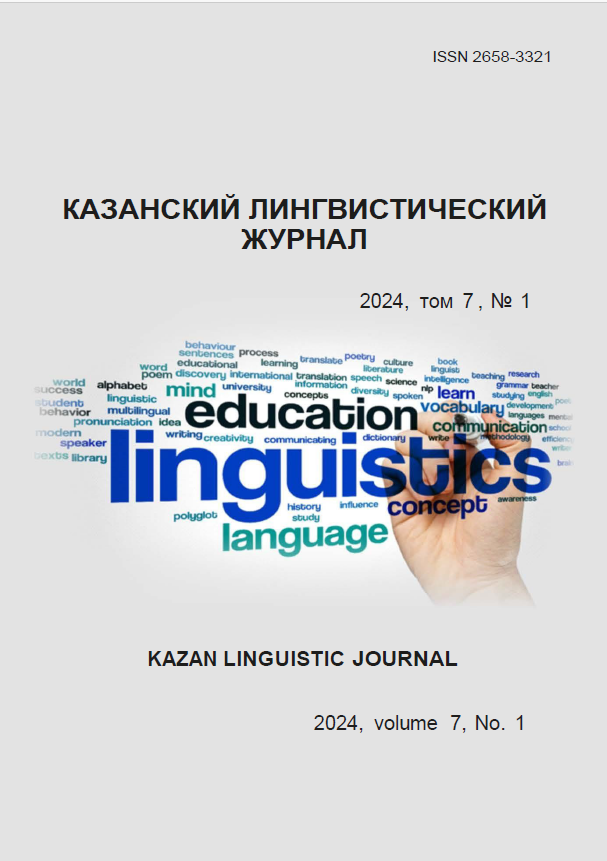Stylistic Features of Representation of Emotivity in Literary Discourse
https://doi.org/10.26907/2658-3321.2024.7.1.105-115
Keywords:
Sylvia Plath, confessional poetry, poetic image of the world, conceptual and semantic dominants, symbol, metaphor; personificationAbstract
The article examines the main themes, genre features and dominant conceptual fields, reflecting the poetic vision of Sylvia Plath as one of the iconic representatives of confessional poetry. Fifteen poems served the material for the research. The linguistic and pragmatic analysis allowed identifying the most frequently recurring motive structures, typical for S. Plath’s poetic image of the world. S. Plath often turns to mythological and biblical themes to explore complex emotional and psychological states of the speaker. In Plath's poetic image of the world, nature notions acquire conceptual significance as a conduit of emotional states and reflections on the essence of human existence. S. Plath’s poetry deals with the complexities of identity formation and the struggle for self-identification in society, which often imposes rigid gender roles and social expectations. A special place in Plath’s poetic image of the world is occupied by the concepts of illness, death and suicide, reflecting her struggle with mental disorders and depression. The themes in her poems, the use of various literary techniques, the poetic exploration of personal experience indicate the confessional aspect of Plath’s poetic heritage, her deep understanding of the human condition, her focus on personal experiences and feelings.
References
References
Lotman Y.M. History and typology of Russian culture. SPb.: Iskusstvo-SPB; 2002. (In Russ.)
Serebriakova S.V. Cognitive dissonance as an interpretive framework for interper-sonal relationships between characters. Voprosy kognitivnoy lingvistiki. 2018;1(54):137–143. (In Russ.)
Markovsky A.V. Current Problems of Linguistics and Culture of Communication. Kazan Linguistic Journal. 2022;5(4):535–546.
Gerasimova E.K. The literary world of Sylvia Plath’s poetry and prose (late 50s and early 60s). Avtoreferat diss. kand. philol. n. Nizhniy Novgorod; 2007. (In Russ.)
Tugulova O.D. A Mother’s Image in the Chinese Female Poetry of the “New Peri-od”. Kazan Linguistic Journal. 2023;6(2):165–175.
Stevenson A. Bitter Fame. A Life of Sylvia Plath. Boston: Houghton Mifflin Com-pany; 1989. (In Eng.)
Showalter E. A Literature of Their Own: British Women Novelists from Brontë to Lessing. N.J: Princeton University Press; 1977. (In Eng.)
Plath S. Collected Poems. Edited by Ted Hughes. Izd. podgot. V.P. Betaki, T.D. Benediktova, E.V. Kassel. M.: Nauka, 2008. (In Russ.)
Kassel E.V. Sylvia Plath: life and work. Sylvia Plath. Sobraniye stikhotvoreniy. V redaktsii Teda Kh’yuza. M.: Nauka, 2008:307–343. (In Russ.)
Venediktova T.D. Sylvia Plath: poetry of pain. Sylvia Plath. Sobraniye sti-khotvoreniy. V redaktsii Teda Kh’yuza. M.: Nauka, 2008: 344–357. (In Russ.)
Sharyshova N.V. Cognitive and metaphorical representation of the conceptual struc-tures Life and Death in poetic discourse (based on the poetry of Dylan Thomas and Sylvia Plath). Avtoreferat diss. kand. philol.n. Belgorod; 2020. (In Russ.)
Chumak-Zhun’ I.I. Poetic text in Russian lyrical discourse in the late XVIII – early XXI centuries. Moskva: Direkt-Media; 2014. (In Russ.)






